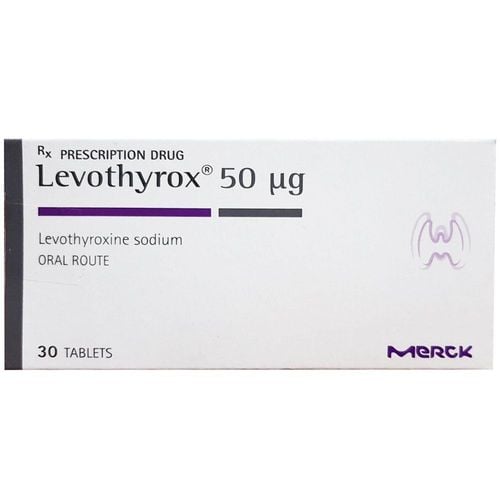This is an automatically translated article.
This article is professionally consulted by Master, Doctor Vu Thi Duyen - Department of Medical Examination & Internal Medicine - Vinmec Hai Phong International General Hospital.When examining a patient with a tachycardia, cardiovascular disease is often thought of immediately. When there is shortness of breath, it is often said that there is a disease in the lungs. In fact, not everyone knows that concurrent symptoms of palpitations, palpitations, bulging eyes, shortness of breath and shaking hands are typical symptoms of hyperthyroidism.
1. What is hyperthyroidism?
The thyroid is a small, butterfly-shaped gland located in the neck area. The main function of the thyroid gland is to help the body control metabolism, regulating how quickly or slowly it uses energy. Hyperthyroidism is a condition in which the thyroid gland secretes too much thyroid hormone T3 and T4 than usual into the body's circulatory system, leading to an overactive body's metabolism. Hormones T3 and T4 travel through the blood throughout the body, affecting the organs involved, disrupting the body's homeostasis regulation, leaving the body uncontrollable.2. Signs suggestive of typical hyperthyroidism

Trong tất cả những nguyên nhân gây khó thở do chèn ép đường thở hay gặp thì nguyên nhân bướu giáp do cường giáp gây khó thở hay gặp nhưng ít được chú ý nhất
2.2. Heart palpitations One of the typical symptoms with a high incidence in hyperthyroidism is palpitations, the feeling of a fast, strong heartbeat in the chest. Some patients may also experience chest pain and shortness of breath.
Besides hyperthyroidism, tachycardia more serious arrhythmias such as atrial fibrillation may also be encountered. If not treated promptly, the disease can worsen and lead to heart failure in hyperthyroid patients.
2.3. Tremors: Increased blood pressure, shaking hands, warm and moist skin, and excessive sweating are common symptoms of hyperthyroidism. Tremor is so much that the patient can't control himself, often shaking with a fast frequency and small amplitude.
2.4. Eye protrusion than normal In hyperthyroidism caused by Graves' disease, the patient may have bulging eyes, frequent tearing and more sensitive to light, or accompanied by conjunctivitis, damage to the cornea. Endocrine hyperthyroidism (Basedow) in addition to bulging eyes often accompanies an enlarged thyroid gland (goiter).
2.5. This is explained by the increased basal metabolic rate of the patient due to excessive secretion of thyroid hormone, causing the body temperature of hyperthyroid patients to be higher than normal, so the patient often cannot tolerate hot places. high temperature or hot weather. Along with the fear of heat, people with hyperthyroidism often sweat, even when they don't do anything but just sit still. When suffering from hyperthyroidism, the patient also changes temperament, gets angry easily, and worries.
2.6. Digestive disorders. Constipation is possible, but frequent diarrhea may be a sign of hyperthyroidism, caused by frequent increased bowel movements.
2.7. Losing a lot of weight despite eating a lot Hyperthyroid patients often lose a lot of weight even though the diet is still the same, even eating more, can lose many kilograms within 1 month.
2.8. Sleep disorders Patients with hyperthyroidism often have difficulty sleeping, restless sleep, shorter sleep than usual, often mistaken for neuropsychiatric disease. Therefore, patients often complain that they always feel tired, have reduced exercise capacity, do not want to exercise much.

Người bệnh cường giáp hay bị khó ngủ, giấc ngủ không yên, giấc ngủ ngắn hơn bình thường
3. Is hyperthyroidism dangerous?
When the disease is not detected and treated early, leading to an excessive increase in hormone levels, the symptoms suddenly become severe, also known as "acute thyroid storm", at this time the patient's life can be threatened even. even death if not promptly diagnosed and treated. Hyperthyroidism complications long-term heart palpitations will cause cardiovascular consequences such as atrial fibrillation, heart failure.If a pregnant mother has hyperthyroidism, it will affect both mother and unborn baby, there is a high risk of stillbirth, miscarriage, fetal growth retardation, premature birth or birth defects and the mother is at risk of preeclampsia. These risks will be minimized if pregnant women are detected early and treated appropriately.
A common complication in pregnant women with hyperthyroidism is a heart condition caused by a too fast heart rate that easily causes heart failure. In addition, some specific treatment methods for hyperthyroidism in pregnant women can also be dangerous to the fetus because the drug is transmitted through the placenta and breast milk. Surgery may be safe in the second trimester of pregnancy, but care should be taken with preoperative treatment to avoid “acute thyroid storm”. Even with successful treatment of maternal hyperthyroidism during pregnancy, the infant is still at risk of developing hyperthyroidism because hyperthyroid antibodies are passed from mother to child. In addition, high doses of antithyroid drugs can cause drug-induced hypothyroidism.
4. Where is the prestigious place to visit for hyperthyroidism?
When there are signs of suspicion of hyperthyroidism, customers can go to the Department of Endocrinology - Diabetes under the Department of General Internal Medicine - Vinmec Times City International General Hospital. This is a reliable address to send the health of yourself and your family.Endocrinology Department under the field of internal medicine, undertakes the examination, diagnosis and treatment of diseases with long-term monitoring nature, based on disease characteristics of chronic diseases related to dysfunction endocrine function and hormones.
Common diseases include: thyroid disorders, hyperthyroidism, thyroiditis, thyroid cancer, Grave-Basedow disease, cholesterol disorders, pituitary and adrenal glands, reproductive hormone disorders, disorders pituitary disorders, pituitary tumors, adrenal disorders...
Specializes in applying new techniques in disease treatment, with modern equipment and a hospital system of international standards. Especially, Vinmec Times City applies the treatment of benign thyroid nodules by high-frequency ablation technique, avoiding the patient's thyroid surgery. There is a team of well-trained and experienced medical doctors:
Associate Professor, Doctor, Doctor Nguyen Thi Hoan Associate Professor, Doctor, Doctor Chu Hoang Van Master, Doctor Pham Thi Thu Huong Master, Doctor Bui Minh Duc Doctor Nguyen Ngoc Son Doctor, Doctor Pham Thi Hong Hoa Master, Doctor Nguyen Thi Cam Tu Master. Doctor. Vu Thi Duyen has more than 10 years of experience in general medical examination and treatment, especially has strengths in examination and treatment specialized in nephrology - Endocrinology.
The doctor has participated in many domestic and foreign seminars and is currently a Nephrologist - Endocrinology Department of General Internal Medicine, Vinmec Hai Phong International General Hospital.
For detailed advice on the examination and treatment of hyperthyroidism at Vinmec Times City, please contact HOTLINE 0243 9743 556 or register online HERE.














